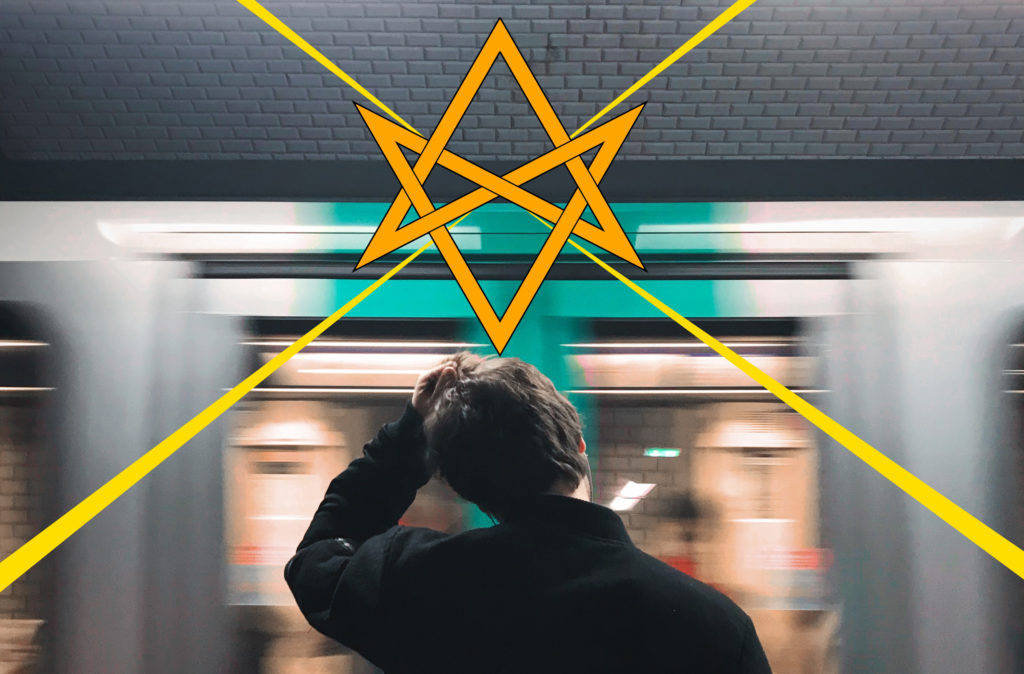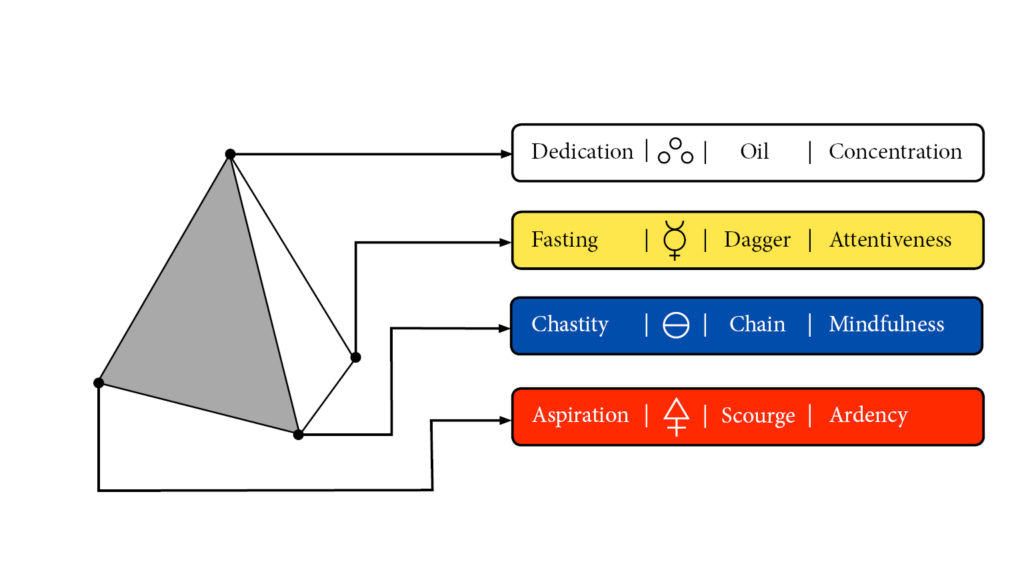
Aleister Crowley mentions three ways in which a person should prepare to receive the sacrament of the Eucharist: chastity, fasting, and continual aspiration.
With regard to the preparations for such Sacraments, the Catholic Church has maintained well enough the traditions of the true Gnostic Church in whose keeping the secrets are. Chastity is a condition; fasting for some hours previous is a condition; an earnest and continual aspiration is a condition. Without these antecedents even the Eucharist of the One and Seven is partially—though such is its intrinsic virtue that it can never be wholly—baulked of its effect.
Magick in Theory and Practice, Chapter 20
Presumably these preparations should be undertaken not only by the clergy consecrating the Eucharist but also Gnostic Mass congregants.
The preconditions of fasting and aspiration are unambiguous, but chastity requires some explanation. In the same passage, Crowley goes on to mention that:
The Word Chastity is used by initiates to signify a certain state of soul and of mind determinant of a certain habit of body which is nowise identical with what is commonly understood. Chastity in the true magical sense of the word is inconceivable to those who are not wholly emancipated from the obsession of sex.
While Crowley does not further specify the meaning of chastity in this context, he likely means that the act is done for the sake of Nuit and without lust of result.
Also, take your fill and will of love as ye will, when, where and with whom ye will! But always unto me. If this be not aright; if ye confound the space-marks, saying: They are one; or saying, They are many; if the ritual be not ever unto me: then expect the direful judgments of Ra Hoor Khuit!
AL I.51-52
But remember, o chosen one, to be me; to follow the love of Nu in the star-lit heaven; to look forth upon men, to tell them this glad word.
AL II.76
The Old Comment to the first verse of the Book of the Law states:
In Nu is Had concealed; by Had is Nu manifested. Nu being 56 and Had 9, their conjunction results in 65, Adonai, the Holy Guardian Angel.
And so another way of stating the same thing is to say that the consummation or consumption of the Eucharist ought to be done with one-pointed devotion to the Holy Guardian Angel, insofar as the aspirant is able to do this.
These three prerequisites of chastity, fasting, and continual aspiration bear a close resemblance with the principles represented by the chain, the dagger, and the scourge.
The chain represents fixity of thought. It corresponds with chastity or singular devotion to Nuit.
The dagger represents control of the appetites which would distract thought. It corresponds with fasting.
The scourge is meant to counteract the torpor of the Nephesh or animal soul. It corresponds with continual aspiration.
After applying the chain, dagger, and scourge to oneself, the magician then anoints themselves with the Holy Oil, symbolic of “that spark of the higher in the Magician which wishes to unite the lower with itself.” (Magick, Part II, Chapter V.) Once the principles represented by the chain, the dagger, and the scourge have been applied to oneself and are in balance with one another, the light of Jechidah or the Holy Guardian Angel naturally breaks through.
These three factors of magick form a close parallel with three factors of sama-samādhi or jhāna (Sanskrit: dhyāna) mentioned in the Buddhist tradition.
The first factor of concentration is mindfulness (sati). This is often interpreted nowadays as bare, non-judgmental awareness of the present moment, but in the context of the Buddha’s teachings, its meaning is much closer to the colloquial meaning of the term. It means keeping in mind what you’re doing. In the context of taking Eucharist, it could mean an appropriate attitude of reverence, knowing that the purpose of this ritual is communion with the divine. It corresponds with the chain and with chastity.
The second factor is alertness (sampajañña). This is the ability of the mind to be aware of what it is doing and to know the difference between path and not path. It is a discriminating faculty, and therefore it corresponds with the dagger and with fasting.
The third factor is ardency (atappa). It means being intent on what you are doing. It does not mean straining but rather continuously developing helpful skills and habits and (with the help of alertness) abandoning unhelpful ones. It corresponds with the scourge and with continual aspiration.
When these three factors join together in a meditation session and are more or less in balance with one another, right concentration naturally arises. This corresponds with the holy oil and the natural way in which the Jechidah or Holy Guardian Angel unites the aspirant with itself.

As we can see, these three prerequisites of chastity, fasting, and continual aspiration form a foundation for the consummation and consumption of a Eucharist, but they are derived from principles which are more general and which apply to any practice of magick or meditation.
This seems complicated, but putting it together is easier than it seems.
Know what it is that you are doing and why. Prior to showing up to the temple, know that you will attend a ritual, the purpose of which is to put you in communion with the Highest: whether you consider that to be Nuit, Babalon, Pan, Jechidah, or the Holy Guardian Angel.
Know that this highest spiritual power is also the source and seed of Thelema itself. It is the power articulated in the Book of the Law, and it is the power that inspired the author of the ritual, Aleister Crowley, when he wrote the ritual.
Let fasting and continual aspiration support this knowledge. If you choose to fast beforehand, know that this action creates physical space within you where the Word embodied in the Eucharist may take root. Know that your desire to know God and your attention to the Path is the nourishment that supports the growth of this knowledge—before, during, and long after the ritual itself.
After you have consumed the Eucharist and have declared, “There is no part of me that is not of the gods!,” return to your seat and sit in silent contemplation, just as the Priest did immediately after consuming his Eucharist. Enjoy communion with this silence directly and simply as possible.
Do not worry. Do not plan. Do not strive. Simply be with the silence.
And as you go about your day—afterward during fellowship, on the drive or bus ride home, when you are going to sleep that evening, or when you are hard at work the following day—remember that silence and return to it. Know it and be with it.
And know with confidence that, “To a Magician thus renewed the attainment of the Knowledge and Conversation of the Holy Guardian Angel becomes an inevitable task.”
